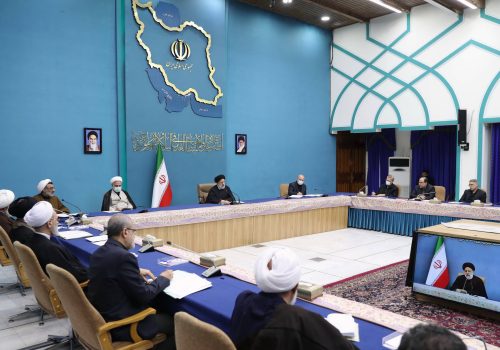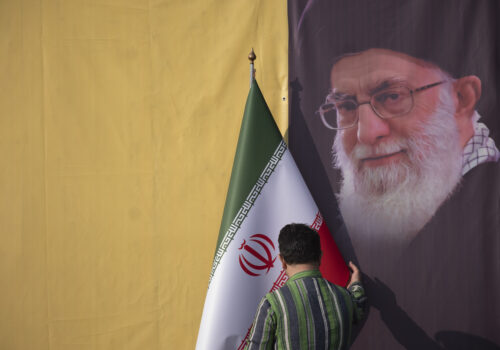Iran targeted human rights sanctions series: What is ‘beneficial ownership’ and how does it relate to targeted sanctions?
به زبان فارسی بخوانید
مجموعۀ تحریمهای هدفمند حقوق بشری ایران: «مالکیت انتفاعی» چیست و چه ارتباطی با تحریمهای هدفمند دارد؟
نویسندگان: سلست کامیوتیک و لساندرا نووُ
به طور خلاصه، تحریمهای هدفمند حقوق بشری ابزاری هستند که دولتها برای مسدود کردن داراییها و عدم صدور ویزا برای افرادی که در موارد نقض حقوق بشر مشارکت نمودهاند، به کار میگیرند. اگر چه به طور کلی مقصد از اِعمال این تحریمها، وادار کردن متخلفان به تغییر رفتارشان است، اما اقدامات مزبور دارای تأثیرات دیگری نیز هستند. برای مثال، منع مجرمین از به دست آوردن ابزارهای مورد نیاز برای ادامۀ بدرفتاری و آزار، و نیز ابراز حمایت از قربانیان این آزارها. اما پروژۀ اقدام قضایی استراتژیک شورای آتلانتیک (SLP) از منابع متعددی شنیده است که بسیاری از افرادی که در اینگونه جوامعِ آسیب دیده به سر میبرند، از جمله جامعۀ ایرانی، در مورد اقدامات مزبور و مفهوم آنها به خصوص به زبان محلی خود اطلاعات کافی در دست ندارند.
در نتیجه، بر اساس بازخورد فوق، تهیۀ این مجموعه وبلاگها آغاز شد تا اطلاعات مهمی در بارۀ تحریمهای هدفمند حقوق بشری که به جمهوری اسلامی ایران مربوط می شود را مطرح نماید. این وبلاگها همچنین مهمترین اخبار روز در مورد مجرمین ایرانی که به دلیل نقض حقوق بشر تحریم شدهاند و علت آن، و نیز هر گونه اطلاعات دیگری که ممکن است مربوط به جوامعی باشد که حقوق شان نقض شده را در اختیار خوانندگان قرار میدهد. در مورد پرسشها و همچنین موضوعاتی که باید مطرح گردد، مشتاقیم نظرات ارسالی خوانندگان، به ویژه اعضای جامعۀ مدنی ایران را دریافت کنیم.
پیشزمینه
با وجود تحریمهای متعددی که علیه افرادی مرتبط با جمهوری اسلامی ایران اعمال شده است، یک «شبکه غیرقانونی جهانی از شرکتهای صوری، بانکها و صرافیها» به بسیاری از این افراد اجازه میدهد از پیامدهای این تحریمها فرار کنند. بخشی از این مسئله به دلیل پیچیدگیهای موجود در شناسایی مالک واقعی یک دارایی، یعنی «مالک انتفاعی»، است. مالک انتفاعی یک شخص حقیقی است—یعنی یک فرد، نه یک شخص حقوقی یا نهاد—که در واقع مالک یا کنترلکننده یک نهاد حقوقی است.
چرا شفافیت در مورد مالکیت انتفاعی مهم است؟
تحریمهای هدفمند معمولاً—هرچند نه همیشه—شامل مسدود کردن داراییهای افراد یا نهادهای تحریمشده میشوند. بنابراین، شناسایی اموال، از جمله نهادهای حقوقی که این افراد یا نهادها مالک یا کنترلکنندۀ آنها هستند، بخشی کلیدی از اجرای تحریمها محسوب میشود.
افزایش شفافیت در مورد مالکیت انتفاعی، همراه با اسناد فاششده، نمونههایی را نشان داده است که خاطرنشان میسازد چرا اطلاعات مربوط به مالکیت انتفاعی برای اجرای تحریمها حیاتی است. اسناد فاششده نشان میدهند که الیگارش روسی، رومن آبراموویچ، مالکیت انتفاعی تراستها را اندکی پس از آغاز تهاجم تمامعیار روسیه به اوکراین در سال ۲۰۲۲ تغییر داده است— که ظاهراً برای اجتناب از مسدود شدن داراییها است. اکنون هفت فرزند او مالک انتفاعی حداقل ۷ میلیارد دلار هستند. زمانی که لوکزامبورگ در سال ۲۰۱۹ یک پایگاه داده عمومی از مالکیت انتفاعی ایجاد کرد، محققان از آن برای ترسیم فعالیتها و کسبوکارهای محلی گروه جنایتکار کالابریایی «ندرانگتا» استفاده کردند؛ شواهد بیشتری از معاملات مُفسدانۀ خانواده رئیسجمهور سابق آرژانتین، مائوریسیو ماکری، در دوره ریاست جمهوری او کشف کردند؛ و مالکان انتفاعی املاکی را که در سراسر اروپا توسط شرکتهای ثبتشده در لوکزامبورگ خریداری شده بودند— مانند املاک یک تاجر اندونزیایی که به نقض حقوق بشر و فرار مالیاتی متهم شده است— شناسایی کردند.
چنین شفافیتی میتواند به محققان در شناسایی داراییهای مرتبط با ایران در سراسر جهان کمک کند، بهویژه در حوزههای قضاییای که مشخص شده است این افراد به آنها سفر کردهاند. در حالی که ملاحظات مهم حریم خصوصی باید در نظر گرفته شود، موانع دسترسی به این اطلاعات باید محدود شوند تا شفافیت تا حد ممکن افزایش یابد. این امر در نهایت میتواند با شناسایی تمامی داراییهای مربوطه که میتوانند سریعاً مسدود شوند و در صورت رعایت استانداردهای قانونی مناسب، مصادره شوند، اثربخشی تحریمهای هدفمند را افزایش دهد.
چه زمانی حوزههای قضایی نهادهای حقوقی اشخاص تحریمشده را محدود میکنند؟
مسدودسازی داراییها بسته به حوزه قضایی متفاوت است، اما آنها معمولاً از دسترسی اشخاص تحریم شده به داراییهایشان، مانند حسابهای بانکی، املاک و مستغلات و سایر داراییهای واقعی جلوگیری میکنند و دیگران را از انجام معاملات مالی با این اشخاص منع مینمایند. در مورد نهادهای حقوقی—که ممکن است چندین مالک و سهامدار داشته باشند و تنها برخی از آنها تحریم شده باشند—حوزههای قضایی معمولاً نیاز دارند که مالکیت یا کنترل اشخاص تحریم شده به یک حد آستانه معین برسد.
حوزههای قضایی چگونه چارچوبهای مالکیت انتفاعی را تغییر میدهند؟
برای جلوگیری از پنهان کردن مالکیت داراییها توسط اشخاص تحریمشده، حوزههای قضایی شفافیت امور تجاری و الزامات گزارشدهی در مورد مالکیت انتفاعی را تشدید کردهاند. گروه ویژه اقدامات مالی (FATF)—یک سازمان بیندولتی که وظیفه مقابله با پولشویی، تأمین مالی تروریسم و گسترش تسلیحات را بر عهده دارد—در سال ۲۰۲۳ راهنمای بهروزشدهای درباره مالکیت انتفاعی منتشر کرد. این راهنما توصیه میکند که کشورها برای مستندسازی اطلاعات مربوط به مالکیت، یک دفتر ثبت مالکیت انتفاعی یا مکانیسمی معادل آن ایجاد کنند.
________________________________________________________________________
سلست کامیوتیک (Celeste Kmiotek) از حقوقدانان شاغل در پروژه اقدامات قضایی استراتژیک در شورای آتلانیک است.
لساندرا نووُ (Lisandra Novo) از حقوقدانان شاغل در پروژه اقدامات قضایی استراتژیک در شورای آتلانیک است.
Targeted human rights sanctions are, in short, a tool governments use to freeze the assets of and deny visas to those perpetrating and complicit in human rights violations. While they are generally intended to prompt offenders to change their behavior, they have additional effects. For example, preventing perpetrators from obtaining the tools needed to continue abuses and showing support for victims. However, the Atlantic Council’s Strategic Litigation Project (SLP) has heard from multiple sources that many people in affected communities—including the Iranian community—do not have sufficient information, especially in their native language, about these measures and what they mean.
Based on this feedback, this blog series was started to highlight important information about targeted human rights sanctions as they relate to the Islamic Republic of Iran; major updates on Iranian perpetrators who have been sanctioned for human rights abuses and why; and any other information that may be relevant to affected communities. Input is welcomed from readers, particularly in Iranian civil society, for questions and topics that should be addressed.
This page will be subsequently updated with a Persian translation of the post.
Background
Despite the numerous sanctions issued against individuals linked to the Islamic Republic of Iran, an “illicit global network of shell companies, banks, and exchange houses” allows many of them to evade the consequences. This is partly due to the complications involved in identifying the true owner of an asset, the “beneficial owner.” A beneficial owner is a natural person—i.e., an individual, as opposed to a legal person or entity—who actually owns or controls a legal entity.
Why is transparency over beneficial ownership important?
Targeted sanctions generally—though not always—involve freezing the assets of designated individuals or entities. Identifying property, including legal entities, they own or control is, therefore, a key component of sanctions enforcement.
Increased transparency over beneficial ownership, as well as leaked documents, have yielded examples that highlight why beneficial ownership information is critical for sanctions enforcement. Leaked documents show that Russian oligarch Roman Abramovich changed the beneficial ownership of trusts shortly after the start of Russia’s 2022 full-scale invasion of Ukraine—seemingly to avoid asset freezes. His seven children are now the beneficial owners of at least $7 billion. When Luxembourg established a public database of beneficial ownership in 2019, investigators used it to map the local activity and businesses of Calabrian crime group ‘Ndrangheta; uncover additional evidence of allegedly corrupt dealings undertaken by former-Argentinian President Mauricio Macri’s family while he was in office; and identify the beneficial owners of properties throughout Europe bought by companies registered in Luxembourg, such as those of an Indonesian businessman accused of human rights abuses and tax evasion.
Such transparency can help investigators identify Iranian-linked assets globally, but especially in jurisdictions where they are known to have traveled. While there are critical privacy considerations that must be taken into account, obstacles to accessing the information must be limited to ensure as much transparency as possible. This can ultimately increase the effectiveness of targeted sanctions through the identification of all relevant assets which can be promptly frozen, and, where the appropriate legal standards are met, seized.
SIGN UP FOR THIS WEEK IN THE MIDEAST NEWSLETTER
When do jurisdictions restrict the legal entities of designated persons?
Asset freezes vary depending on the jurisdiction, but they generally prevent designated persons from accessing their property, such as bank accounts, real estate, and other real property, and ban others from engaging in financial transactions with those designated persons. When it comes to legal entities—which may have multiple owners and stakeholders, only some of whom are designated—jurisdictions generally require that designated persons’ ownership or control reaches a certain threshold.
- Australia: The Australian government prohibits dealing with “controlled assets,” which are those owned or controlled by a designated person or entity, but there does not appear to be public guidance or a definition for determining ownership or control.
- Canada: When a property is deemed controlled by a designated person, Canadian persons are prohibited from “dealing in” it. In 2023, Canada amended its Special Economic Measures Act and Justice for Victims of Corrupt Foreign Officials Act to include provisions under which a designated person is considered to control an entity when it meets one of three criteria: if they have at least 50 percent ownership or voting rights; they have the direct or indirect ability to “change the composition or powers of the entity’s board of directors”; or, it “is reasonable to conclude” that they are directly or indirectly able to direct the entity’s activities.
- European Union: If an entity is owned or controlled by a designated person, then the funds and economic resources of that entity must also be frozen. Ownership involves possession of over 50 percent “proprietary rights” or a majority interest. Control is determined according to a non-exhaustive list of criteria, which includes the right or exercise of power “to appoint or remove a majority of the members of the administrative, management or supervisory body”; the right to use all or part of the entity’s assets; and the sharing of financial liabilities of the entity, or guaranteeing those liabilities.
- United Kingdom: An entity is subject to an asset freeze and restrictions on “some financial services” when it is owned or controlled, directly or indirectly, by a designated person. Like Canada, the United Kingdom requires one of three criteria to be met to establish ownership or control: when the person directly or indirectly holds more than 50 percent of the shares or voting rights; when they have the right to directly or indirectly appoint or remove a majority of the board of directors; or when it’s “reasonable to expect” the person would be able to “ensure the affairs of the entity are conducted in accordance with the person’s wishes.”
- United States: The US government uses the “50 Percent Rule”: when one or more “blocked” (i.e., designated) persons own an entity “by 50 percent or more in the aggregate,” then that entity is itself considered blocked. While the United States does not evaluate control under this rule, it may designate the entity itself if it is determined to be controlled by a designated person.
How are jurisdictions changing beneficial ownership frameworks?
To prevent designated persons from hiding their ownership of assets, jurisdictions have strengthened corporate transparency and reporting requirements on beneficial ownership. The Financial Action Task Force (FATF)—an intergovernmental organization tasked with combatting money laundering and terrorist and proliferation financing—released updated guidance on beneficial ownership in 2023. It recommended that countries establish a beneficial ownership register or alternative mechanism to document ownership information.
- Australia: The Australian government has committed to beneficial ownership reform between January 2024 and December 2025 as part of its Third Open Government Partnership National Action Plan. This will include implementing a public beneficial ownership register, for which the Treasury previously undertook a consultation process in 2022.
- Canada: As of January 22, 2024, all corporations governed by the Canada Business Corporations Act are required to file beneficial ownership (or “individuals with significant control,” or ISC) information. Businesses have been required to maintain their own ISC registers since June 2019 but were not previously required to file them with the government. Some of the information in the filings—such as full legal names, the description of the significant control, the dates of significant control, and certain addresses—will be available through an online search on Corporations Canada, the country’s federal corporate regulator.
- European Union: The EU uses the Beneficial Ownership Registers Interconnection System (BORIS) to link the national registers of member states Iceland, Liechtenstein, and Norway. This was set up in line with a 2015 European Parliament and Council directive, as amended in 2018. Access to some information is restricted according to national laws. In November 2022, the Court of Justice of the European Union annulled provisions of a directive that granted public access to beneficial ownership information. A new version of the directive would instead grant access to the register to persons with a “legitimate interest” in the beneficial ownership information, like journalists or civil society. In January 2024, the European Council and Parliament reached a provisional agreement that includes provisions to make beneficial ownership rules “more harmonised and transparent,” for example, by clarifying rules to prevent beneficial owners from “hiding behind multiple layers of ownership of companies.” Notably, the beneficial ownership threshold was set at 25 percent.
- United Kingdom: The UK has three registers: for “people with significant control,” for trusts, and for overseas entities. Overseas entities were required to register with Companies House, the country’s corporate regulator, and tell them who the beneficial owners or managing officers were by January 21, 2023. Still, in February 2023, it was reported that almost half the companies required to do so had not. An act in the final stages of legislative approval will include reforms to Companies House, such as identity verification for certain personnel, more effective investigation and enforcement powers, and enhanced personal privacy protections.
- United States: Effective January 1, 2024, as required under the 2021 Corporate Transparency Act, certain “reporting companies”—including US-based corporations and limited liability companies, as well as foreign companies registered to do business in the US—must report information about their beneficial owners to the Financial Crimes Enforcement Network (FinCEN). This information will be stored in the Beneficial Ownership Information database. The Department of the Treasury issued a final rule that makes money services businesses, casinos, and “other non-bank financial institutions that have anti-money laundering obligations” eligible for access to the beneficial ownership registry.
Celeste Kmiotek is a staff lawyer for the Strategic Litigation Project at the Atlantic Council.
Lisandra Novo is a staff lawyer for the Strategic Litigation Project at the Atlantic Council.
Further reading
Wed, Jul 26, 2023
Iran targeted human rights sanctions series: UK designates the Supreme Council of the Cultural Revolution
IranSource By Celeste Kmiotek, Lisandra Novo
The United Kingdom designated the Supreme Council of the Cultural Revolution and its new secretary, Abdol Hossein Khosrow Panah, on July 6.
Thu, Jan 4, 2024
Iran targeted human rights sanctions series: Why are people and entities sanctioned for human rights abuses?
IranSource By Celeste Kmiotek, Lisandra Novo
Every perpetrator designated by a jurisdiction for targeted sanctions generally faces the same consequences.
Wed, Mar 20, 2024
Iran targeted human rights sanctions series: Understanding ‘terrorist organization’ designations in relation to the IRGC
IranSource By Celeste Kmiotek, Lisandra Novo
This post looks at how terrorist organization listings are decided, the consequences, and how these are related to targeted human rights sanctions.
Image: Former chairman of Iran's Central Bank, Abdolnasser Hemmati, is speaking to the media while standing next to portraits of the late Iranian President Ebrahim Raisi (L) and Iran's late Foreign Minister Hossein Amir-Abdollahian, who died in a helicopter crash, at a media center in the Iranian Interior Ministry headquarters after registering as a Presidential elections candidate during the second day of candidates' registration for Iran's early Presidential elections, in Tehran, Iran, on May 31, 2024. (Photo by Morteza Nikoubazl/NurPhoto)NO USE FRANCE


